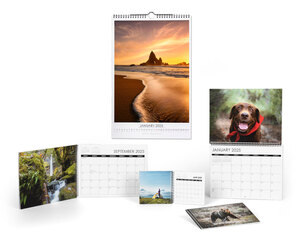A Step-by-Step Guide to Creating Custom Calendars for Your Business in Malaysia
Body
Custom calendars are an excellent way to promote your business, keep your brand in front of your clients all year long, and strengthen customer relationships. In Malaysia, where businesses often strive to create a personal connection with their customers, custom calendars provide a perfect mix of functionality and advertising. Whether you want to create a calendar as a corporate gift or a promotional item, here's a step-by-step guide to creating your custom calendar.
Step 1: Define Your Purpose and Audience
Before diving into the design process, it’s essential to define the purpose of your custom calendar. Is it a marketing tool for brand awareness, a functional item for clients, or a commemorative gift for employees? The purpose will influence its design and functionality.
Next, consider your audience. Is it for business clients, employees, or general consumers? Understanding your target audience will help you choose the right type of calendar and design elements that will resonate with them. For example, a calendar designed for business clients might feature a sleek, professional look, while a calendar for employees could incorporate a more personalized touch.
Step 2: Choose the Type of Calendar
There are various types of calendars you can create, each with its advantages. Here are the most common options:
-
Wall Calendars: These are large and often highly visible. They make great gifts and are perfect for customers who display them at their homes or offices.
-
Desktop Calendars: These are compact and ideal for businesses that want to place calendars on desks, ensuring that the brand stays in view every day.
-
Pocket Calendars: These are smaller and more portable, often used as giveaways or included with other promotional materials.
-
Magnetic Calendars: Perfect for sticking on fridges or filing cabinets, magnetic calendars ensure that your brand stays visible in clients’ everyday environments.
-
Planner Style Calendars: These are more interactive, providing clients with a place to jot down notes, meetings, or events. Planners can be an excellent option for businesses that want to provide a more practical and useful calendar.
Step 3: Select a Layout and Format
Once you've decided on the type of calendar, it’s time to choose the layout and format. There are several formats you can choose from, depending on how much information you want to display. Some popular options include:
-
Traditional Grid Format: The standard calendar layout with months arranged in a grid. This is ideal for showing dates, holidays, and business events.
-
Full-page Images: If your business has a visually striking product or service, you might want to showcase it with full-page images for each month.
-
Themed Calendar: For businesses with specific niches, such as holidays, sports, or lifestyle brands, a themed calendar can be a great way to tie in with your marketing efforts.
You can also choose to include additional features, such as a space for notes, important dates marked (e.g., company holidays, promotions, or sales), or even QR codes for online promotions.
Step 4: Design the Calendar
Design is one of the most important steps in creating a custom calendar. A well-designed calendar will grab attention and be remembered. When designing your calendar, consider the following:
-
Branding Consistency: Ensure that the design aligns with your brand’s colors, fonts, and logo. This will reinforce brand recognition and consistency.
-
High-Quality Images: Choose images that represent your business, products, or services. High-resolution photos are key to ensuring that your calendar looks professional.
-
Use of Color: Bright and vibrant colors can make the calendar stand out, but ensure they match your brand's identity. For example, green might be suitable for an eco-friendly business, while blue and gray are often associated with professionalism and reliability.
-
Incorporate Useful Information: Besides dates, you can include motivational quotes, tips related to your business, or important industry information that your audience might find helpful.
-
Readability: Make sure that the calendar is easy to read at a glance. The font size should be large enough, and there should be enough space for users to write notes on their personal schedules.
Step 5: Personalize the Calendar
Personalization can make your calendar feel even more special to the recipient. Here are a few ideas for customization:
-
Employee or Client Names: Adding a personal touch, such as the names of your clients or employees, can create a sense of exclusivity.
-
Company Milestones or Client Events: You could highlight specific dates important to your business or your clients, such as anniversaries, product launches, or major achievements.
-
Cultural Relevance: In Malaysia, it’s important to be mindful of the local culture. Including Malaysian public holidays such as Hari Raya, Chinese New Year, and Deepavali makes your calendar not only useful but also culturally relevant to the audience.
Step 6: Choose a Printer
Once you’ve finalized your design, it's time to choose a printing company. When selecting a printer, consider the following:
-
Print Quality: Ensure that the printing company offers high-quality printing services, as poor print quality could undermine the overall look of your calendar.
-
Budget: Compare quotes from different printing companies. Keep in mind that quality should not be compromised for price, but it’s important to find a cost-effective option.
-
Delivery Time: Check the turnaround time, especially if you’re planning to distribute the calendars before the start of the year.
-
Sustainability: If eco-friendliness is a priority for your business, choose a printer that offers environmentally friendly options, such as recycled paper or eco-friendly inks.
Step 7: Distribute the Calendars
The final step is to distribute your custom calendars. Whether you plan to hand them out at trade shows, send them as corporate gifts, or give them away in your retail store, it’s important to reach your target audience.
-
Corporate Clients: Send the calendars as a year-end gift or with a thank-you note. Consider including a discount or promotion to incentivize further engagement.
-
Employee Calendars: Personalized calendars for employees can be part of their annual bonuses or a gesture of appreciation. It fosters a sense of belonging and strengthens your company culture.
-
Giveaways at Events: If you attend events or trade shows, handing out your calendars is an easy way to capture leads and reinforce your brand.
Conclusion
Creating custom calendars for your business in Malaysia is a powerful marketing tool that not only promotes your brand but also provides a practical and thoughtful gift for your clients and employees. By following these simple steps, you can design a calendar that enhances your business’s visibility, engages your audience, and leaves a lasting impression all year long. So, why wait? Start planning your custom calendar printing today and see the difference it makes for your business in Malaysia.







Comments